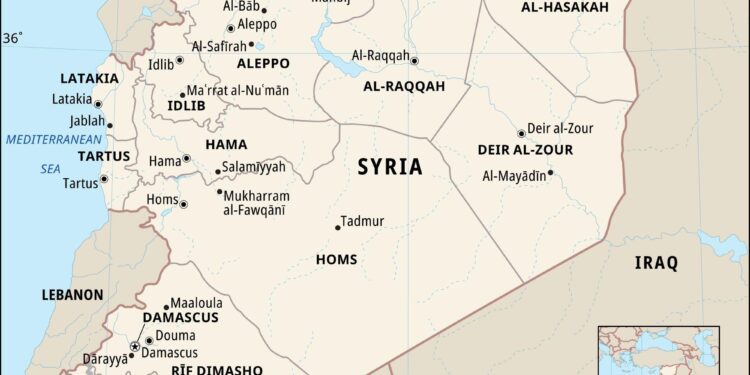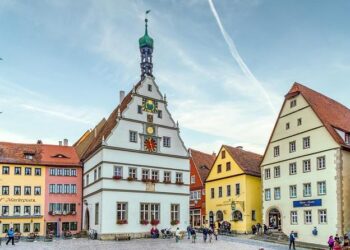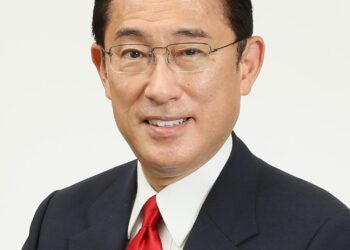In the evolving landscape of Syria’s political landscape, where old alliances are being reshaped and new partnerships are emerging, an unexpected narrative is taking shape. as the country grapples with the aftermath of a lengthy civil war and seeks to establish a stable governance framework, some former Syrian Jews, who fled the country decades ago, are finding themselves in a position to offer support to the nation’s new leaders. This unlikely coalition is rooted in shared ancient experiences and a mutual desire for stability, as Syria’s recent shifts open the door to dialogue between communities that had long been separated by conflict. This article explores the surprising common ground between Syria’s current rulers and the Jewish diaspora, shedding light on the potential for reconciliation and collaboration in a nation still healing from deep-seated divisions.
Exploring Historical Ties Between syrian Leaders and Exiled Jewish Communities
Throughout the decades of conflict and political upheaval in Syria, the complex relationships between its leaders and the Jewish diaspora who fled the country have frequently enough gone overlooked. Many jews who left Syria in the mid-20th century faced persecution and repression, yet their historical ties to the region have become a point of reconciliation and potential alliance for the nation’s new leadership. Notably, these relationships are not merely a remnant of the past; they have evolved into a nuanced dialogue about identity, heritage, and the possibility of mutual support. By reaching out to these exiled communities, Syrian leaders are signaling a willingness to reconnect with both their cultural history and a global network that can offer economic and strategic benefits.
This connection has roots in several factors:
- Cultural Heritage: A shared history that spans centuries, weaving together narratives of coexistence and resilience.
- Economic Partnerships: As many exiled Jews become successful abroad, they hold the potential for lucrative investments and business opportunities back in Syria.
- Political leverage: Establishing ties with exiled Jewish leaders can enhance diplomatic relationships with influential Western nations.
| Aspect | Impact |
|---|---|
| Cultural Exchange | Revives interest in historical ties and shared identities. |
| Economic Growth | Potential influx of investments from Jewish communities abroad. |
| Diplomatic Relations | Strengthens Syria’s position in international politics. |
The resurgence of dialogues surrounding these connections reflects a broader trend of re-evaluating historical narratives that have often been steeped in conflict and division. As Syria’s emerging leaders seek allies in unexpected places, it becomes evident that the recognition of shared history can pave the way for reconciliation. By embracing this complexity, both Syrian officials and the Jewish diaspora may find common ground that fosters healing and long-term stability.
Unpacking the Role of Jewish Diaspora in Syria’s Political Landscape
The historical relationship between the Jewish diaspora and Syria is rich and complex, frequently enough punctuated by waves of migration and shifting political alliances. After establishing vibrant communities, many Jews fled the country, especially during times of unrest in the mid-20th century. Today, remnants of these communities and their descendants play an unexpectedly significant role in shaping Syria’s political landscape from afar. As Syria navigates a fraught transition led by emerging leaders, the diaspora is finding new avenues to engage, using their networks and resources to influence political discourse and support humanitarian initiatives.
Key aspects of this evolving alliance include:
- Cultural Advocacy: Members of the diaspora seek to preserve and promote syrian Jewish heritage, fostering a sense of identity that transcends borders.
- Humanitarian Efforts: Many individuals and organizations are focused on providing aid to those affected by the Syrian conflict, through both financial contributions and advocacy campaigns.
- Political Diplomacy: Utilizing their relationships in both local and international political spheres, these former residents of Syria are negotiating partnerships aimed at fostering stability and reconciliation within the nation.
| Key Figures in Diaspora | Contributions | Areas of Influence |
|---|---|---|
| David Z. Nissim | Advocacy for Jewish heritage preservation | Cultural diplomacy |
| Naomi Harari | Humanitarian fundraising | NGO collaboration |
| Jonathan Cohen | Political lobbying | International relations |
Building Bridges: Potential Collaborations for a Peaceful Syrian Future
As Syria emerges from years of conflict, potential partnerships that transcend historical divides offer a fresh perspective on building a peaceful future. Notably, a group of Jewish individuals who fled Syria decades ago now find themselves willing to engage in constructive dialogue with the new leadership.These unexpected alliances can be vital in fostering reconciliation, as they bring unique perspectives and experiences that enrich the narrative of a united Syria. With their personal stories deeply woven into the historical fabric of Syrian society, these former residents can help bridge the gap between different communities.
To facilitate broader collaboration, various platforms and initiatives are gaining momentum, aimed at uniting interests across ethnic and religious lines.Some potential collaborative areas include:
- Cultural Exchange Programs: Organizing events that celebrate shared heritage and promote understanding among diverse groups.
- Community Growth Projects: Focusing on rebuilding infrastructure and supporting local economies through joint efforts.
- Educational Initiatives: Establishing programs that encourage dialogue and learning about Syria’s multifaceted history.
The integration of these voices and initiatives could play a pivotal role in creating a sustainable path towards peace, ensuring that Syria’s future is shaped by a collective will to heal and rebuild.
to Wrap It Up
In a complex and ever-evolving political landscape, the emergence of unexpected alliances highlights the intricate tapestry of Syria’s future. as the new leadership navigates the challenges of rebuilding a war-torn nation, the rekindling of relationships with Jewish communities that once called Syria home presents a unique narrative of hope and reconciliation. these surprising allies, whose roots trace back to a shared history, offer not only financial support but also significant cultural and diplomatic ties that could pave the way for a more inclusive and prosperous Syria. As the nation turns a new leaf, it remains to be seen how these partnerships will influence the political and social dynamics in the months and years to come. The continuing dialogue between these disparate groups serves as a reminder of the power of shared heritage and the potential for cooperation in the face of adversity.
















